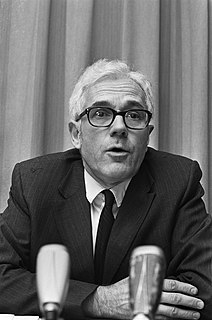A Quote by Elizabeth Gilbert
God is an experience of supreme love.
Quote Topics
Related Quotes
In the dominant Western religious system, the love of God is essentially the same as the belief in God, in God’s existence, God’s justice, God’s love. The love of God is essentially a thought experience. In the Eastern religions and in mysticism, the love of God is an intense feeling experience of oneness, inseparably linked with the expression of this love in every act of living.
When we assume God to be a guiding principle well, sure enough, a god is usually characteristic of a certain system of thought or morality. For instance, take the Christian God, the summum bonum: God is love, love being the highest moral principle; and God is spirit, the spirit being the supreme idea of meaning. All our Christian moral concepts derive from such assumptions, and the supreme essence of all of them is what we call God.
The notion that the Supreme Court comes up with the ruling and that automatically subjects the two other branches to following it defies everything there is about the three equal branches of government. The Supreme Court is not the supreme branch. And for God's sake, it isn't the Supreme Being. It is the Supreme Court.
The experience of not forgetting consciousness alone is the state of devotion which is the relationship of unfading real love, because the real knowledge of Self, which shines as the undivided supreme bliss itself, surges up as the nature of love. Love itself is the actual form of God. That is pure bliss. Call it pure bliss, God, Self, or what you will. That is devotion, that is realization and that is everything.
Love is basic for the very survival of mankind. I'm convinced that love is the only absolute ultimately; love is the highest good. He who loves has somehow discovered the meaning of ultimate reality. He who hates does not know God; he who hates has no knowledge of God. Love is the supreme unifying principle of life.
O God, when I listen to the voices of animals, the sounds of trees, the murmurings of water, the singing of birds, the whistling of the wind, or the boom of thunder, I see in them evidence of Your unity; I feel that You are supreme power, omniscience, supreme knowledge, and supreme justice. I recognize You, O God, in the trials I am going through. May Your pleasure be my pleasure, too. May I be Your joy, the joy that a Father feels for a son. And may I think of You calmly and with determination, even when I find it hard to say I love You.
The life-converting experience is not the discovery that I have choices to make that determine the way I live out my existence, but the awareness that my that my existence itself is not in the center. Once I 'know' God, that is, once I experience God's love as the love in which all my human experiences are anchored, I can desire only one thing: to be in that love.
It is not insignificant that my first apprehension of the love of God was granted in an experience with my father. Nor is it generally uncommon that God is apprehended in experience. Nor, in fact, can the divine and human meeting happen any other way. God is not a God of the pulpit, though the pulpit proclaim him. He is a God in and of the histories of humankind. What is significant is that I should have to say so.
To me there is nothing more sacred than love and laughter, and there is nothing more prayerful than playfulness. When you are in love, all fears disappear, and when you become love yourself, even death becomes irrelevant. Jesus is not very far away from the truth when he says, "God is love." Certainly God is power, the greatest power. I want to improve upon Jesus: I don't say God is love, I say love is God. To me God is only a symbol and love is a reality. God is only a myth - love is the experience of millions of people. God is only a word, but love can become a dance in your heart.
Only love for the Supreme Lord is true Bhakti. Love for any other being, however great, is not Bhakti. The "Supreme Lord" here means Ishvara, the concept of which transcends what you in the West mean by the personal God. "He from whom this universe proceeds, in whom it rests, and to whom it returns, He is Ishvara, the Eternal, the Pure, the All-Merciful, the Almighty, the Ever-Free, the All-Knowing, the Teacher of all teachers, the Lord who of His own nature is inexpressible Love."
God is not a person; God is manifestation itself. We think that God is a superhuman person, but God is not a person. He is not a subject. We can never experience God in a subject/object experience. God is what makes a subject/object experience possible. We can never see God or experience God as separate from ourselves. God is a being but there is no division.





































